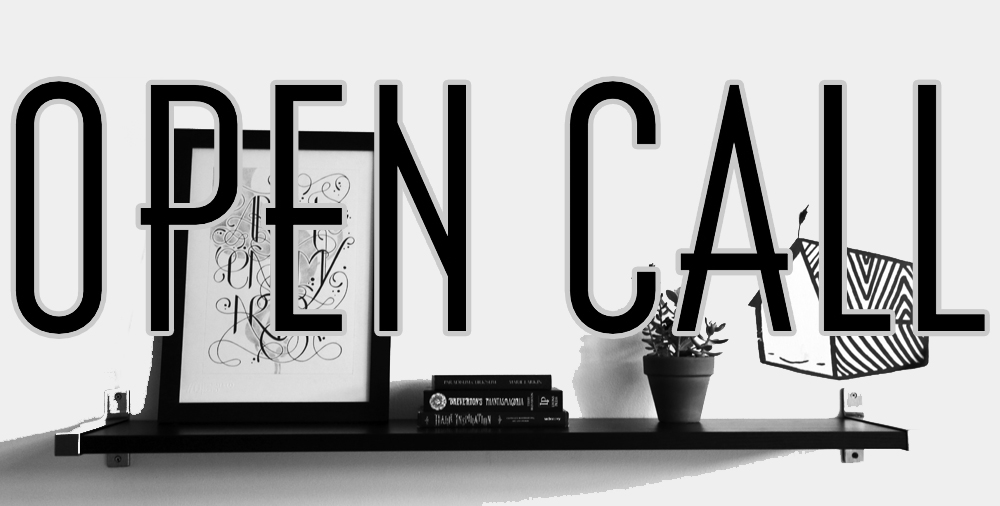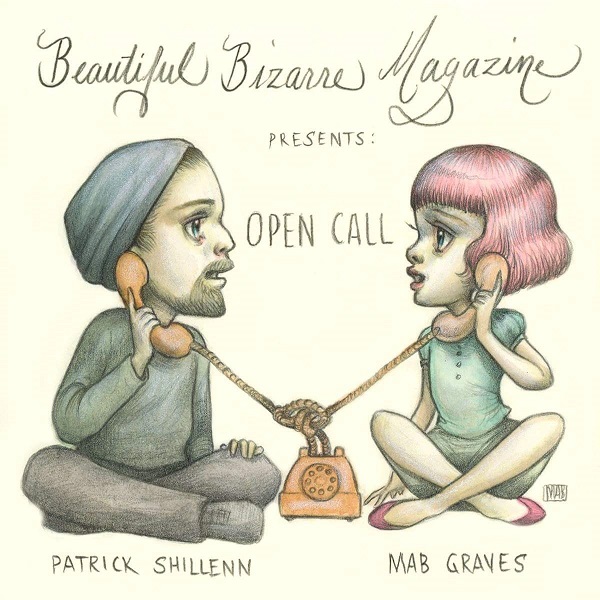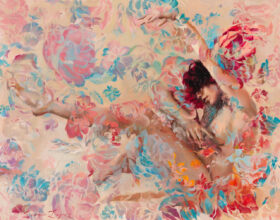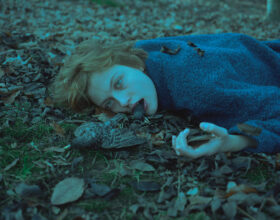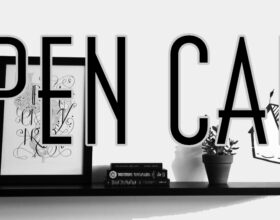Welcome to the 20th edition of Open Call with special guest Mab Graves. 20! Today we’re talking about Mab’s early years, being self-taught, quitting art school during orientation, and the future of galleries. We’re also going to answer some of the questions from your emails.
We love hearing from you so please email us at opencall@beautifulbizarre.net with any questions you have, concerns, success stories, challenges, or any other topic you’d like to discuss with a Gallery Director. Every other Monday we’ll publish a few of our favorites along with my replies. If you don’t see your email published, it does not necessarily mean it won’t be saved for a future installment. There have already been way too many good questions to make it into just one edition. Visit my online author profile and stay updated on past editions.
Mab and I have been planning to do an Open Call together for quite awhile so it’s sort of funny that after months and months, when we finally ended up getting together for it we picked a morning where both of our sleep schedules were totally out of whack for very different reasons. One thing that’s obvious about Mab though, is she’s a G-D Trooper, and I very much appreciated her time.
M: Yeah of course! We’ve had this on the books for a long time!
P: It’s a long time coming for sure. So a few days ago, maybe last week, you posted this amazing drawing from when you were a kid…
M: haha! I found this stack of old drawings and it was all dinosaurs, and crabby cats, and there was a ferris wheel with this nefarious man smoking a pipe hanging off of it, and a rainbow made of eyeballs, and I’m like ‘hmm. I think my career has plateaued!”
P: It’s remarkable how much your subject matter has changed over the years! haha! How old were you?
M: I was 4 or 5!
P: Did you always have an interest in expressing yourself through art and drawing?
M: I was obsessed with drawing from the time I could sit and color. I’d come home from preschool and my mom never had to wonder where I was at, or worry if I was quiet like other mom’s, like ‘where is she at?’. I was drawing. I was always coloring. That was just a huge part of my personality and who I was. I got so much fulfillment as a child creating my own worlds and making things out of paper. One time I made an entire dollhouse myself and sculpted everything, even a little Victrola that moved and had hinges made out of clay.
“One time I made an entire dollhouse myself and sculpted everything, even a little Victrola that moved and had hinges made out of clay. “
P: Was there ever a period of time when you weren’t making things? Not necessarily that you weren’t interested but maybe you were just busy doing other things?
M: Never.
P: Never?
M: Well, when I graduated high school and started working maybe, I had less time… but even then I always had my sketchbook with me. I had my bag and my apron – I was a server – but I always had that with me, every shift, every day, every week as a server.
P: Did you take any classes in high school to specialize in art?
M: Well, I was actually home schooled. My parents educated all four of us girls together so we had an art curriculum, but didn’t have extracurricular things – but it was great because it gave me a lot of structure as an individual which prepared me so well for being a small business owner. I could set my own schedule and I would be done with my work early and could spend the rest of my day drawing, creating, and helping my sisters. I even graduated high school at 16 because I could do 2 years worth in 1 year if I felt like it, and I loved school so I got done with it pretty quick.
P: Well, that’s interesting, so were you always on the same lesson plan as your sisters?
M: Yeah, there were work books for each subject and year but then we had time for individual interests like I did martial arts, my sister did horse riding, one of my sisters played a harp, so we had time for those things. But my mom always had a little cabinet full of glitter, and glue, and puffballs, and construction paper, so if we ever wanted to make things and create that was always there.
P: Did you ever have a point where you saw yourself going on to formal education and going to college?
M: Yeah absolutely, I had been accepted to (an art school) and I went to orientation actually, and during that, they asked me what type of art I was into and I told them I really loved classical painting. The masters! Leonardo, Michelangelo. That was my thing, and the lady looked at me and said, ‘*sigh* we’ll get that out of you. We’re a modern art school’. And I smiled, and I never came back! Because I was like, I don’t want…
P: You didn’t want to get that out of you?
“I don’t ever want what I love to be gotten out of me”
M: I don’t ever want what I love to be gotten out of me. I walked around the hallway and saw chewing gum stretched on canvas and said to myself, ‘this is not what I want to do’. So I left that day and I said alright, I’m going to teach myself. And I said to myself if there’s ever a point where there’s something that I cannot learn myself, if I reach a point where I just can’t crack it, I’ll go to school. I’m going that day and I’ll apply and I’ll go to art school, and I’ll pay someone to teach me. The thing about art is the minute it clicks in your mind, how to take what you see in the outside world or what you see in your mind and make it come out of your hand, you’ve got it. Then you just have to keep honing that skill, but no one can teach you that ‘click’. They can give you tools to set up, but I’ve seen kids graduating art school where it’s obvious that it still hasn’t clicked, they’re struggling and they’re graduating with enormous amounts of debt and a piece of paper that says they’re an artist but they’re not there yet. Despite the fact that they love art and they want to be an artist they haven’t had that ‘a-ha!’ moment yet when it all really happens for you.
P: I’ve seen that too, you know I’ve had the opportunity a couple times since we started Arch Enemy to go into some schools for guest crits or something like that, and you always encounter at least a few students where you can tell they aren’t inspired. They haven’t had that moment and are sort of phoning it in. And what’s worse is when you talk to them about it and they’re like, ‘well once schools done I’ll just be inspired and decide my style then.’ and you know someone’s going to break the news to them that it doesn’t work like that and they’ve squandered what was an opportunity to figure some of this out. Any of it.
M: You know there has never been a client, a gallery, a collector, anyone who I’ve worked with on a professional basis who has asked where I went to school. It doesn’t matter. Your work is all that speaks. If you go to school hopefully you make some connections, you know people you have a little more industry knowledge, you also have kind of a controlled environment where maybe put some real life things off for a few years and take that time to really work on your skills. But professionally, no one cares. They’re going to look at your work and decide if they like it, or if it works for the project, and then you’ll get the job. But if it’s not, it doesn’t matter if you went to the best art school in the world, because if your art’s not where it should be it’s not going to make a hill of beans.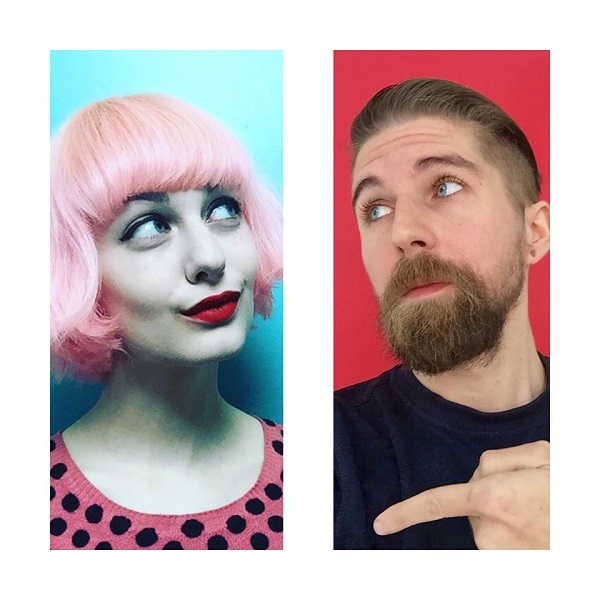
P: Can you think of any examples where you would believe it makes a positive difference?
M: I really honestly don’t believe it has that much of an effect. The one benefit you have from school is getting some time, and some shortcuts. Being self-taught I had to learn from crawling! I had to learn everything myself and figure it out, and I’m sure if I had formal training someone could have said, ‘oh no, you do this here and there’ and I’d probably be a lot further along than where I am. I have a sense of pride because nobody helped me get here, I did it on my own, but I’d probably be further along if I had people to show me shortcuts, especially with something like oils which is an incredibly technical medium and involved all these different color theories and underlays, and technical parts.
P: So what did you do? How did you learn instead?
M: Well, I didn’t start painting until 2009 and that was in gauche and acrylic. Then I started in 2014 painting in oils I had put it off and put it off and was like ‘errrhhhhgg’ I tried a couple times and didn’t know how to do it and would end up with a painting with all the dust and hair in it, and it was awful! I was used to spending 15 hours working on a piece and with oils you can’t paint like that, you build and you plan it, you have to let it dry… So I put it off until I had enough practice and was ready for the next step.
P: So you graduated at 16. You quit art school at orientation and you knew that wasn’t the right path, at least not the right path for you. What was your plan?
M: Getting a serving job! Getting my own place and working. Even with wanting to go to school, I never wanted to be an artist as a career. I wanted to study art because I loved it, but I never planned on being an artist.
“Art was everything that was me, and I would never risk losing my passion because I don’t know who I’d be as a person if this died in me somehow”
P: What did you plan to be?
M: I planned on working a crappy job and painting for myself at night. I was always told if you make what you love your career, you’ll stop loving it. And art was everything that was me, and I would never risk losing my passion because I don’t know who I’d be as a person if this died in me somehow. So I was just planning on working a whatever job forever and drawing and painting for myself at night, and I did that for a few years. I was a secret painter! I was in the closet and nobody knew it and then one day I got outed!
P: What happened?
M: It was after I met LP and he was an artist and he was connected and I had a room in the house I was renting filled floor to ceiling with paintings.
P: A secret room behind a bookcase?
M: Haha yes! And he was like, ‘wait a second’. And he got me a show. You know the benefit of being a secret painter was I spent my whole life preparing instead of being out there and trying to make it, posting student work or beginner work and having people see all the processes of me becoming who I was. I came out of the closet as a pretty fully developed artist, so it caused a little bit of a splash and people were like, ‘where did she come from?’ Haha. That’s why whenever I talk to students I always say, ‘Don’t post your work. Don’t post it until you feel that you’ve created a piece that’s so awesome you feel it inside.’ Wait. Because you’ll have so much more if you come out of the gate like – POW! – I see students posting things and they say, ‘well this isn’t very good’ or ‘I sort of messed this up’ and I want to say, ‘why are you putting that out on the internet if you know it’s not very good? Why are you telling people that your work is no good?’
“Everything I paint is like my child. She might have two light sources or a weird shadow, or eyes that are a little lopsided, but it doesn’t matter, I love her and she’s perfect”
P: Have you ever had a moment where you have that feeling, and you know it’s good, and then you face criticism or are surprised by the reaction, and have any doubts?
M: (silence)
P: No? Really?
M: There are two kinds of painters, there are self-critical painters, and then there are what I call ‘mother painters’ who love everything they do, and I am a mother painter and everything I paint is like my child. She might have two light sources or a weird shadow, or eyes that are a little lopsided, but it doesn’t matter, I love her and she’s perfect.
P: What happened after that first show, now for the first time you’re a public painter, what happened next?
M: I had a few pieces in that show, and from there I got some invitations to do other shows and then, after my first solo show, my website went VIRAL! Just totally, accidentally – it got blogged someplace that got reblogged and it went crazy and of course at that point I had nothing on my website, and nothing for sale I had like a bazillion-ka-jillion hits and I made nothing! I was like, ‘that was my one shot! Ahhhh!’
P: You blew it!
M: But even with that it was still a few more years until I went full-time. I said ‘this is nice but this isn’t real. This is a moment’ and it took a few more years before it made sense to quit my day job. But before I did I promised myself if this ever starts feeling like work I’m going to go pick up job applications down at the local bar. I’m not going to risk losing this.
P: You didn’t have anything for sale when your website went viral and had to learn that lesson after you missed an opportunity. What about after that? Did you find yourself figuring things like that out incrementally, or did you plan for the business parts of being an artist?
M: I definitely learned from making mistakes. I learned from getting smacked on the nose and learning not to do that again! The first year I made even a little money as an artist tax time came around and I was like ‘What?! I have to pay taxes on this?!”. I’m just an artist! and my tax person said, ‘no, you’re a business’, and it was a big learning curve. That’s one thing they don’t prepare kids for in art school.
“Every time you draw something new you’re investing in yourself”
Sometimes an artist will ask ‘what do you do when you aren’t feeling inspired? And for a self-taught artist, you have like an art-bank that’s in your head and if you ever reach a point where you don’t know what to paint next, that’s your time to study. You go to the museum, and every creature that you draw, ever leaf and every stick, every time you draw something new you’re investing in yourself. You’re adding to your bank. And even when you start working professionally, that’s your time to study. You have a lot to learn! I did hundreds and hundreds of hours studying marketing, and how to read contracts and understand legalese.
P: Do you think your personality makes it easier to do that, to take advantage of those times?
M: I do, because I like to work. I don’t like being told what to do, I like being my own boss, and a benefit of that is having that fiercely independent drive. I always feel like ‘if this person can figure it out, so can I’. We live in the age of the internet and you can literally learn to do ANYTHING. It’s incredible! And I do feel like that fiercely independent part of me is huge part in being successful at what I do.
Patrick and Mab,
I find having an (online) shop in addition to my fine art pieces very valuable.
You are successful in business for a long time already, do you have some advices for running an Etsy Shop beside of good photography and a wonderful product/print/artwork?
Is looking for new customers on fairs or conventions reasonable or can I focus solely on my online following?
Lioba
M: It depends on the product or project. This year I’m really focusing on things that not everyone else is doing. It starts with the idea of what I want to create, then I do hours and hours of research to figure out how to do it, or if that product is even possible. Then I get quotes, figure out who I can work with best. I usually package everything myself, even though I don’t really have time for it, it would be sad if I ever got too busy to do that part. And if I mess something up this way it’s my fault!
It’s really really big to know how to photograph your product or photographing your art. I do all my own photography, all my own writing and photo edits. I built my own light box for about $7.
P: What about your customers? Do you rely mostly on social media?
M: Someone told me early on to never pay for advertising. Especially when you’re starting out, paying for advertising is such a bad idea. It’s so hard to make sure that what you’re paying for is worth it. I don’t do anything besides trying to make cool products and using social media. And people are awesome, fans are awesome. They repost things and write about it. If someone writes about something I’m doing or blogs about it I’ll write them a thank you note to say ‘thank you so much’ and that what they do is so important. And it’s important to make sure you’re appreciating those things. I’ll pick 3-10 people every week. Fans, clients, and I’ll make them something special. It’s all about spreading good karma in the art world and I want to sort of create my own world within that, because sometimes that world as it is can be kind of weird and petty, and I don’t want to live in that world. I still love every single artist that I’ve ever loved since I was 14. Ray Caesar, and Gary Baseman, Glen Barr, I still love their work and one day I realized there isn’t a cap to how much someone can love. You can love all the artists! So I started posting other people’s work, friends work and other artist’s work, and not just posting it but actually talking about it. ‘This person is a badass and this is why. Your life will be so much better with this artist’s work in it’. I’m not only an artist but I’m an art lover, and I want to spread as much positivity and love as I can, and I know that’s definitely changed my scene. I see a lot of other artists and people who have many haters and many trolls, and I feel so fortunate to have the crew that I’ve got! My fans are awesome people, and I think you have the power to draw your people to you.
P: I totally believe that, for me it’s a recent thing and I can’t remember where I heard it first but it’s true. You attract the people who do the things you’re putting off, so when you broadcast negativity, you broadcast doubt, you broadcast criticism, those are the people you attract and it creates these cycles and it becomes more difficult to break out of those patterns.
M: Definitely, I’m a huge believer in karma and I really, really think it comes back, and I’m always making sure I’m on the positive side of that. I always want to make sure that I’m focusing on giving with my gift because I don’t deserve it. I don’t know why I got picked out of all the people out there to work the way I can work right now, but I realize that it’s such a huge gift and I’m so blessed and I try so hard to earn it everyday and be grateful. I consciously focus on creating the world I want to be in.
Mab,
What’s the best way to approach a gallery, and what should I expect from them?
Katy
P: Being a person who’s so self-sufficient and independent, some people might think it’s interesting that you are still in the habit of partnering with galleries. You just had a solo show with us in April, and you have another coming up this week with Corey Helford Gallery. What’s their role for you?
M: Galleries have been an important part of the art scene and they still are. I don’t need to work with galleries, but I want to be part of the art community and you’ve got to play the game. Good galleries have this ability to harness this talent and work with a group of incredibly difficult people. Working with a group of artists is so hard because everyone is different and everyone does things differently. It’s not like working with a group of doctors or lawyers where offices basically works the same way. Galleries, who are brave enough to say I’m called to work with this group of very, very difficult people and bring something new into the art world, are a part of the world in themselves. However, it is difficult because most galleries are still taking the same percentages as they were 10 or 15 years ago and things were different because they were bringing more to the table.
P: Exactly. This is the conversation you and I had when we decided to do this Open Call together. I had told you that when Lawren, Noah, and I had first got together and started talking about what ended up being Arch Enemy, I wasn’t personally interested in starting an art gallery. At least I wasn’t interested in starting what I understood an art gallery to be, at that time. And over the last 4 years of doing this, that feeling has done nothing but grow into a stronger and stronger belief that it’s time for galleries to evolve what they are.
M: Yes!
P: They can still be galleries and they’re still going to have this fundamental responsibility to handle retail tasks. Client relations, and things, but they’re going to have to be a lot more. I think they’re going to have to work more like agencies. Before Arch Enemy I worked mostly in music and entertainment, and I was lucky enough to have the experience of working with these agencies that were sort of in between the record company and the artist, and we’d have to handle all of these different tasks. Street marketing departments, and tv or radio departments, publicity departments, online, artist management departments, all these things under one roof and for each artist you’d put together the pieces that made sense for them, and there’s nothing like that for visual artists. I think that’s a really exciting possibility!
I think it’s a good analogy, at least in my eyes, I started working at those companies right when the internet was coming this bigger and bigger problem for the business side of music, and attacking the traditional business model. And you saw this divide in the clients, you had some and they were just refusing to change. They spent decades doing things this way, and raking in money and they refuse to compromise. Then you had these new companies and they either were going to do things differently, because they wanted to or realized they had to, and they needed to redefine what their role was. The people who are most interesting to me, and that I wanted to learn from, are those who turned to the artist and said, ‘okay – you don’t need me to get some kid to listen to your song anymore. You can do that yourself. So what do you still need? Do you need someone to do merch deals for you? Do you need a publicist? Do you need someone to help with the overhead costs of recording, or touring? Do you need someone to be your project manager and check in with all those people during the day, and talk to your agent and your merch company, and your publicist and make sure everyone is working? What do you need?’ And they evolved to be that.
M: Totally, the internet has changed every job in visual arts. The galleries who are working against that and saying okay, I need to figure out how to bring more to the table are the ones who are going to survive. For galleries it used to be like Mad Men! And it’s hard to lose that position, but there are plenty of things a gallery can still offer artists. They just have to accept that the services that a lot of them offer are losing value. They’re of no value to me. I give up a lot of money when I work with galleries so I try only to work with galleries who give me something and I like working with. With many galleries there’s kind of a predatory feeling, it’s not teamwork. It’s like serfdom, the galleries are taking money from the artist and the artist are giving it because they think they need the gallery to survive. With you guys and the galleries I like to work with, I didn’t feel that at all. I felt like we were a team, we are working together and we’re doing something together. Oh my gosh, there are so many even in our scene who are so fishy.
Patrick and Mab,
I am an artist that uses many different mediums. As I am trying to pursue my dreams of becoming a professional, I have come across a couple articles that basically say I am an amateur artist because I switch mediums. Even though a lot of my art is similar. I would like to do better so I can get into galleries and sell my work. How should I go about picking a medium to stick with?
P: I’ve got this email a bunch of times and it baffles me, not just the question but that so many people ask it. I really don’t know where it comes from or who these people are who are telling them not to work in different mediums. I think it’s fine, I don’t get it, I don’t think this a thing – what about you?
M: I use many different mediums; I use different mediums even in the same piece. Each one does something special and has it’s own voice and song. For example with me and my paintings and my illustrations, those are very different. In my illustrations, I’m telling stories with characters, or stories from my own life. With painting, I am talking about states of being or emotion. So the characters in my paintings aren’t anyone, they aren’t a person, they’re innocence or fragility, and it’s meant to be totally different, and I don’t think you should have to pick or silence yourself. Don’t limit yourself or limit your voice. For me the hardheaded Leo in me is like, if someone tells me to do something well I will definitely not do that ever! Ever, ever!
P: Haha you’ll show them!
M: I will do the opposite of that for the rest of my life! There’s no amateur medium. It doesn’t matter. It’s just like having a pedigree, at the end of the day people just care what the work looks like. There are no rules as far as your creative self outside of the rules you make for yourself. Just balance all the noise and focus on your craft. Just put your hard hat on and do what you like.
Mab’s new solo show, Epicure opens May 20th at Corey Helford Gallery



